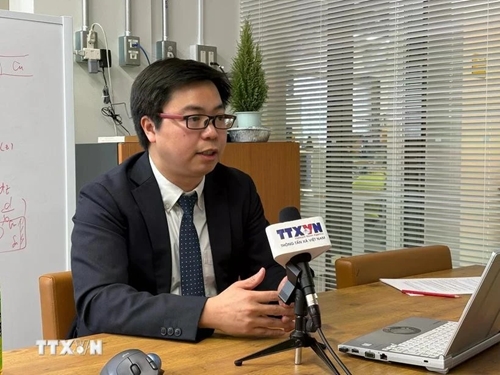Talking to Vietnam News Agency correspondents in Tokyo, Anh affirmed that the resolution holds strategic significance as Vietnam needs to innovate its growth model, and improve labor productivity and competitiveness. The resolution identifies science, technology, innovation and national digital transformation as the main driving force for socio-economic development, helping Vietnam escape the growth model based on cheap labor and resources.
    |
 |
|
Chairman of the Association of Vietnamese Intellectuals in Japan Dr. Le Duc Anh talks to Vietnam News Agency correspondents in Tokyo. |
He pointed to several industries with potential for breakthroughs if Vietnam makes strategic investments and effectively utilizes technology. They are information technology and digital transformation, production and manufacturing technology, semiconductor technology, biotechnology and healthcare, renewable energy, and high-tech agriculture.
Regarding the promotion of links between the state, scientists and businesses, the expert said that Vietnam needs to have clear financial and legal policies, promote research and application, and build an innovation ecosystem.
He stressed the necessity for promoting financial mechanisms and support policies, adding that the state should increase investment in research and development (R&D), create a research support fund, and provide tax incentives for businesses investing in technology.
In addition, it is essential to enhance linkages between universities, research institutes and enterprises, encourage enterprises to sponsor and cooperate in research with universities, form innovation centers, build startup "incubators," and support the commercialization of research results, Anh stated.
Another important mechanism is intellectual property protection and benefit sharing, which requires improving the intellectual property protection system, helping scientists feel secure in transferring technology, and clearly defining the rights and responsibilities of each party when collaborating on research.
He also proposed Vietnam build an innovation ecosystem, form high-tech zones, research and application centers with major universities as the core, connect scientists and businesses, strengthen human resources training, and encourage enterprises to use advanced technology.
According to the expert, there is currently a large number of young Vietnamese intellectuals living, studying and working abroad, especially in Japan, who can contribute a lot to innovation and sci-tech development in Vietnam.
To attract this force, Vietnam should create opportunities, attractive policies and a good working environment, Anh said, adding that a flexible cooperation mechanism is also needed to enable intellectuals to participate in domestic projects without requiring their full-time presence.
Source: VNA